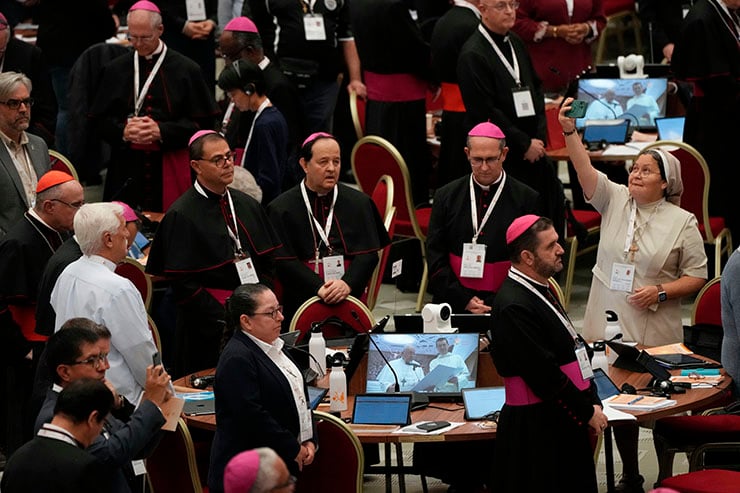On Oct. 28 the Synod on Synodality released its summary report on its first session.
It’s an appalling document. Commentators have noted that the progressives managing the synodal process came away with few concrete victories. Nothing specific is said, for example, about female or married priests, “transgender” people, or the status and treatment of homosexual relationships.
On the other hand, a great deal is said about outreach, inclusion, and nonjudgmental accompaniment, and about overcoming informal and institutional barriers. So the effect is to encourage progressives in their strategy of turning doctrines and disciplines they don’t like into dead letters by depriving them of effect. After all, these things stand in the way of the full inclusion of those who reject them, so why take them seriously?
In any event, tomorrow is another day. As Pope Francis has repeatedly emphasized, “time is greater than space,” meaning that getting things started is more important than the current state of play. The second session of the Synod will convene next October, so the progressives have a year to find ways to mitigate resistance. And the document is full of calls for further reflection and discussion on disputed issues that would include a very broad range of participants, including social scientists and non-Catholics. Why expect anything specifically Catholic to come out of that?
But substantive issues are less important than what the document says about Catholicism and the Church in general. It’s pervaded by a wholly this-worldly and thus deeply anti-Christian vision that divorces those things from transcendent realities and reduces them to the projects of those running the institution. As the report puts it, “the Church ‘is’ mission”—that is, she can be identified wholly with the things she determines that her members should be doing.
And what are those things? From the report we learn that there are “diverse expressions of being Church,” all of which are evidently to be celebrated, but some are better than others, especially under present circumstances. In particular we find synodality “indicate[s] a mode of being Church that integrates communion, mission and participation” and is the uniquely right path to follow today.
That path involves an open-ended process of mutual listening involving the whole Church, and even those outside of her, guided by appropriately qualified facilitators. Those participating are to put aside preconceptions and try to arrive at common understandings that take into account all experiences and concerns—especially those of the poor and marginalized—regarding the needs of the Church, her members, and the world.
It appears that these needs are primarily the social concerns emphasized by progressives, such as peace, poverty, racism, sexism, migration, climate change, the difficulties suffered by people not in traditional family relationships, and so on. They don’t seem to include anything relating to social cohesion and functioning, except to the extent these might be promoted by universal, mutual, nonjudgmental acceptance and accompaniment.
Thus, no concern is expressed for the stability and functioning of nonbureaucratic social arrangements, like particular cultures and the natural family, that allow ordinary people to lead productive and rewarding lives in community with others. Nor does the report concern itself with the knowledge and love of God, except as implicit in concern for this-worldly well-being. The contemplative spirit is wholly alien to it.
The attention devoted by the Synod to the “Pact of the Catacombs,” a document signed by progressive participants in the Second Vatican Council that prefigured liberation theology, confirms that the needs with which the Synod concerns itself are to met symbolically by gestures of solidarity but practically through state action on a global scale.
Be that as it may, Catholicism is apparently to be defined by the process and its content identified with whatever comes out of it. As the report puts it, “synodical processes … allowing the existence of that consensus of the faithful (consensus fidelium) to be confirmed. This process provides a sure criterion for determining whether a particular doctrine or practice belongs to the Apostolic faith.” So if you want to know if something is Catholic, you should look to the synodal process for clarification. As many have said, to distrust it is to distrust the Holy Spirit.
With that in mind, it is not surprising that apart from references to the current pope and the Second Vatican Council, along with vague invocations of Jesus, the Trinity, Baptism, Confirmation, and the Eucharist, which together somehow guarantee that the synodal Church will be the vehicle of the Holy Spirit, appeals to the usual Catholic sources of authority are absent. Since tradition is dynamic, and so is the Trinity, why not pay attention to dynamism rather than bygone forms?
But how significant is all this? The report has no weight as a teaching document, and the pope is extremely skittish about changing Catholic doctrine—he knows he can’t do it—but the Synod is a striking example of how the tendencies that have done so much to diminish the Church’s place in her members’ lives have been boosted during the current pontificate.
It’s hard to imagine why anyone, apart from activists who want to change Church teaching and ecclesiastical bureaucrats who like going to meetings and producing documents, would want to bother with a Catholic Church reconfigured in accordance with the vision presented in this document. Whatever the new synodality promotes, it won’t be its stated goals.
To the extent the consensus of Catholics attached to the Church is the standard, the Synod on Synodality looks like a flop. May it be seen in the future as the last gasp in the Catholic Church of the same failed approach that has destroyed the Protestant mainstream in the West.

Leave a Reply